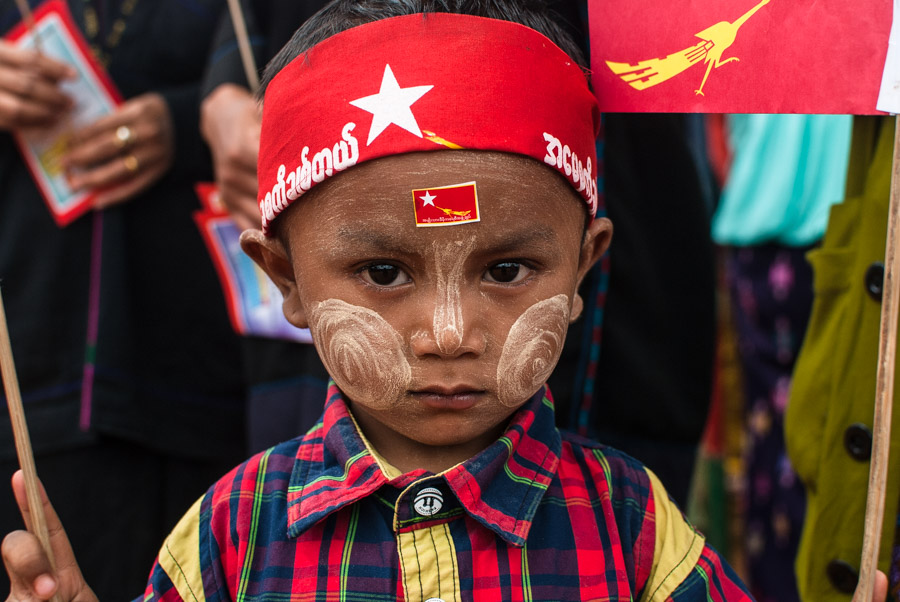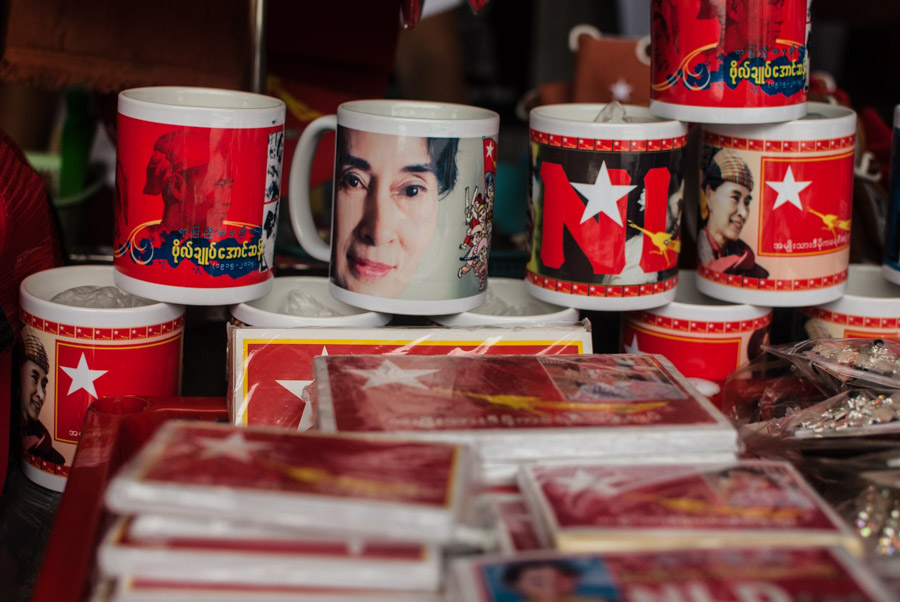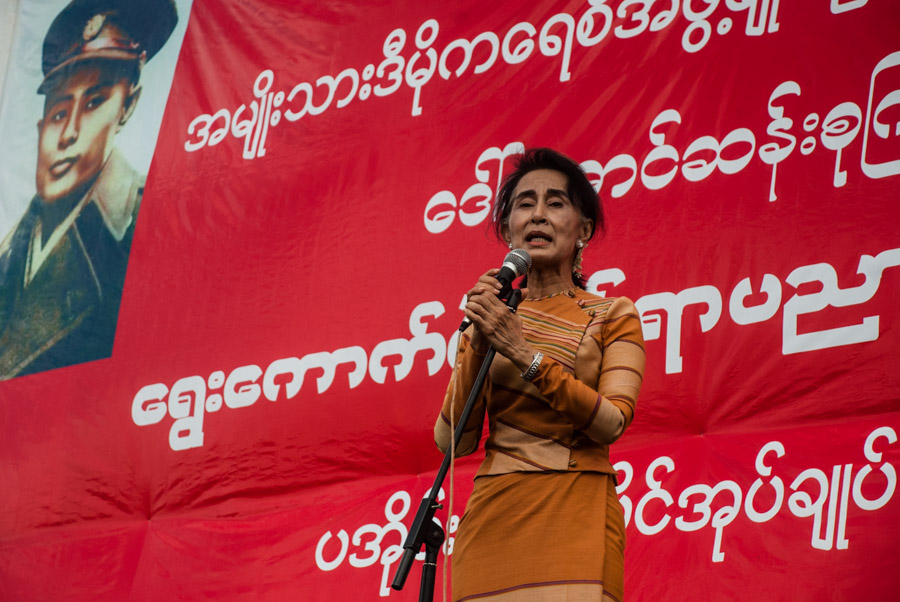Next month the people of Myanmar head to the polls for a famous general election. With ethnic allegiances, miniature coups and a skewed constitution already in play, the outcome looks anything but predictable
By any account next month’s election in Myanmar will be historic. It will be the country’s first free national ballot since 1990 and the first in which opposition figures, led by the living symbol Aung San Suu Kyi, will be vying in a general election against the military-backed Union Solidarity and Development Party (USDP).
It will also be the largest election in Myanmar’s history: a complex, kaleidoscopic race that will see 93 parties and 6,189 candidates contest 1,171 constituencies in national and regional parliaments. When Myanmar’s voters go to the polls on November 8, the world will truly be watching.
For many, the election will be a critical pivot-point for this star-crossed country of 51 million, whose six decades of modern history have been a catalogue of ethnic conflict, frustrated state-building and the worst extremes of political repression.
Kicking off the National League for Democracy’s (NLD’s) campaign on September 8, Suu Kyi said the election and its aftermath could be a crucial “turning point” in the reforms that have taken place since the government of President Thein Sein took office in 2011. “For the first time in decades our people will have a real chance of bringing about real change. This is a chance that we cannot afford to let slip,” she said.
While the 2015 election will indeed be an important marker on the twisting road out of military rule, the ultimate destination remains far from a foregone conclusion. Indeed, rather than determining one way or the other the success of Myanmar’s so-called democratic “transition” – a word suggesting a natural, even inevitable, process – the poll is likely to give way to a new phase of fragility, contingency and political gymnastics.
Next month’s election hasn’t emerged from nowhere. It has been designed as the culminating step of the “roadmap to disciplined flourishing democracy” launched by the military in 2003 – a plan to secure military control while modernising the economy and rehabilitating the country’s image abroad. The reality, often overlooked amid the very real changes wrought by Myanmar’s historic opening, is that the USDP and its military backers have scripted this election not to yield power, but to strengthen their hold on it.
To navigate their way through a general election, the USDP and its military backers have tilted the political gameboard heavily in their own favour. Myanmar’s constitution, passed by a bogus plebiscite in 2008, bars the popular Suu Kyi from running for the presidency and reserves a quarter of seats in parliament for military representatives. This alone ensures that even if the NLD wins a majority of the vote, which many observers expect it will, the electoral system may prevent it from securing a ruling majority in parliament and thus keep it from exercising power.
The magic number for the NLD is 333 – the number of seats it needs to win to control the 664-seat Union Parliament and elect the country’s next president. In comparison, the USDP-military bloc, with 166 military seats already in the bag, needs to win just 167 more to retain effective control. Put another way, the USDP has written the rules to ensure that its opponents will need to win twice as many seats to secure the same outcome. “Our party and all the people of Burma want democracy very speedily, but the army will only give democracy very slowly,” said Nyan Win, the NLD’s long-time spokesperson.
To navigate their way through a general election, the USDP and its military backers have tilted the political gameboard heavily in their own favour.
With few credible opinion polls in the impoverished country, it remains unclear whether the NLD can reach the magic threshold of 333 seats. A rare poll conducted in early 2015 by the Taiwan-based Asian Barometer Survey was inconclusive: 24% nationwide said they would vote NLD, compared with 16% for the USDP, but more than half expressed no preference.
Despite Suu Kyi’s evident popularity, observers say the party may struggle to secure a majority. Yan Myo Thein, a Yangon-based political analyst, said that the USDP, linked to powerful “crony” tycoons, enjoys a large advantage in resources, which will weigh particularly heavily in rural areas. “The ruling party will focus on rural votes, not on township votes or city votes,” he said. “They can buy votes in the villages.”
The NLD also faces a steep challenge in the country’s seven ethnic states, where Suu Kyi’s aura – strong in the central heartland – shines less brightly. While the Nobel laureate enjoys goddess status among the ethnic Burman majority, the view is less rosy from the country’s ethnic periphery. “The majority of ethnic people think that she doesn’t care about our problems,” said Aik Paung, the chairman of the Shan Nationalities Development Party (SNDP), one of the country’s largest ethnic parties.
This is no small issue: 84 seats in the upper house – fully half of those up for election – are in ethnic states. A smaller, but still significant, proportion is up for grabs in the lower house. “In some areas, such as Shan State, the NLD will not win in many constituencies. There are very strong ethnic parties,” said Myat Thu, the founder of the Yangon School of Political Science.
Ethnic allegiances could well play a crucial part in the selection of Myanmar’s next president after the election. Once the new parliament is in session, three candidates will be nominated, one each from the lower house, upper house and military bloc. A joint session of the 664-member parliament will then vote on which of the three candidates will be president, with the two runners-up becoming vice-presidents.
Thiha Saw, a veteran journalist and president of the Myanmar Journalists Association, said that in a post-election scenario where no party has an outright majority, the USDP’s ability to dispense political favours – including state chief minister posts – to small parties could be crucial. “They still have these kinds of advantages, even though they won’t win a majority. They still have some cards to play,” he said. Several observers said that the larger ethnic parties – including the SNDP, which currently holds 22 parliamentary seats, and the Rakhine National Party (16 seats) – were most likely to support the ruling party.
So far the NLD remains undaunted in the face of these challenges, staking everything on the hope that Suu Kyi’s personality cult will deliver it the majority it needs. “We think we are the only [party] who can compete, to transform the situation and reform the situation,” said Nyan Win.
It’s too soon to say whether or not the NLD’s strategy will pay off, but Yan Myo Thein said a range of tools and strategies – favourable arithmetic, vote-splitting, political horse-trading – could all act as an effective buffer against Suu Kyi’s resonant political brand. “The military leaders and the ex-military leaders have pushed the NLD into a narrow corner,” he said.
That, at least, is the plan. But the law of unintended consequences cuts both ways. Until last month, the presumptive frontrunner for president was the USDP’s Shwe Mann, the powerful speaker of the lower house and a rival of President Thein Sein. Given his constructive relationship with Suu Kyi, many believed Shwe Mann would enjoy the NLD’s backing for president in lieu of ‘The Lady’ herself.
This scenario is now looking less likely. On the night of August 12-13, security forces surrounded the headquarters of the USDP in the capital Naypyidaw and, in a purge that recalled an earlier phase of junta rule, Shwe Mann was removed as USDP leader. Information Minister Ye Htut later justified the move on the grounds of Shwe Mann’s closeness to rival party leaders and his “very questionable” decisions in parliament.
Myanmar’s election will test the narrative of reform and ‘transition’ against the complex realities of a country still deeply scarred by ethnic conflict and a troubled sense of national selfhood.
Sean Turnell, an economist and long-time Myanmar watcher at Macquarie University in Sydney, said that the Shwe Mann affair showed that for all the USDP’s careful planning, it was hard to keep everybody on script. “The people in charge of the transition are partly in control, and partly have the tiger by the tail,” Turnell said. “They’re not fully in control of events.”
At the same time, the opposition – burdened with the task of transforming itself in short order from a besieged core of activists into a cohesive, nationwide political organisation – faces its own centrifugal challenges. Many grassroots NLD members were angered when the party released its candidate lists in August, and failed to include a raft of popular figures, including charismatic ‘88 Generation’ student activists such as Ko Ko Gyi. Overlooked in favour of appointees from Yangon, some township leaders have announced they will run as independents.
While Suu Kyi has urged voters to support the party rather than specific candidates, Yan Myo Thein said the affair highlighted the perhaps inevitable divisions between the central leadership and grassroots. “My worry is that the vote can be split and spread,” he said.
In a broader sense, the political contest will play out against a backdrop of daunting logistical challenges. Armed conflicts continue around the country’s periphery, and it is by no means certain that a substantial Nationwide Ceasefire Agreement will be signed in time for the election.
According to ethnic party officials in Shan State, six constituencies under the control of ethnic armed groups will not hold elections at all, suggesting that Myanmar’s deep ethnic fissures will remain a cardinal challenge far beyond the next electoral cycle.
A second potential problem lies with the electoral process itself. In an August report, the US-based Carter Centre reported that despite considerable achievements in preparing for the election, “key aspects of the process remain unregulated or non-transparent, such as advance voting, election dispute mechanisms, election security and the criteria for cancelling elections in particular constituencies”.
In late August the Union Election Commission (UEC) announced that parties would not be permitted to criticise the armed forces or the 2008 constitution – the two main impediments to a free and fair election. The UEC and the Ministry of Information will vet all party statements to ensure no language is included “that can split the Tatmadaw [Myanmar military] or that can disgrace and damage the dignity of the Tatmadaw”.
Suu Kyi and others have also raised concerns about flaws in voter lists, which allegedly include many dead voters’ names and omit a large number that are still living. Myat Thu said the errors seemed to be concentrated in NLD strongholds, where the error-rate ran as high as 50%.
But the biggest challenge, from the standpoint of international credibility, may be the disenfranchisement – in a general context of persecution and immiseration – of the ethnic Rohingya Muslims, an embattled minority mostly living in Rakhine State in the west of the country. The Rohingya have been ostracised since deadly unrest in 2012 between Buddhists and Muslims in Rakhine State, which left some 140,000 people, most of them Rohingya, confined to internal displacement camps.
Now, in the run-up to the elections, most Rohingya voters have been scrubbed from voter lists on the grounds that they’re not citizens. In the Rakhine State constituency of Buthidaung, as many as 150,000 Muslims cast votes in 2010 but, after a government move to revoke temporary identity cards, few will do so this year. The UEC has also disqualified Rohingya candidates on the grounds of citizenship, among them Shwe Maung, a self-identifying Rohingya lawmaker elected for the USDP in 2010. After his appeal was rejected by the UEC, he described the decision as “illogical” and “illegal”.
Myanmar’s nationalist turn – the dark side of Thein Sein’s reforms – could well benefit the incumbent USDP. Influential nationalist groups such as the Association for the Protection of Race and Religion, known by its Burmese acronym Ma Ba Tha, and the 969 movement, led by the rabidly anti-Muslim monk Ashin Wirathu, have denounced Suu Kyi and the NLD as insufficiently dedicated to safeguarding Buddhism against a supposed Muslim “threat”. “She has emphasised democracy, but not nationalism,” Wirathu told Southeast Asia Globe in an interview in May. “I fully trust in Thein Sein.” Under pressure from these fanatics, the NLD, too, has baulked at running many Muslim candidates.
All this adds a potentially inflammatory ingredient to an election that is already set to test the narrative of reform and ‘transition’ against the complex realities of a country still deeply scarred by ethnic conflict and a troubled sense of national selfhood.
After years of observing his country’s fractious politics, Thiha Saw said that simply tracking the current dynamics offers little hint of what might be to come. After the unexpected purge of Shwe Mann, he said that “anything could happen”.
“What’s going to happen on the day, or what will the outcome be? We have to say we don’t know,” he said. “One thing we’re really sure about is that things will get more complicated along the way.”
Published in the Southeast Asia Globe, October 2015.







